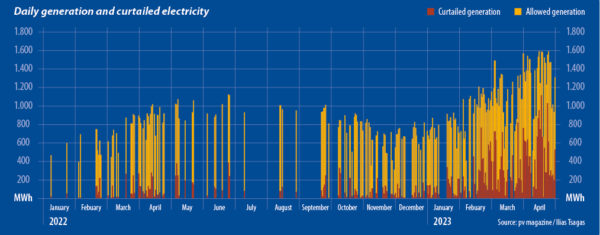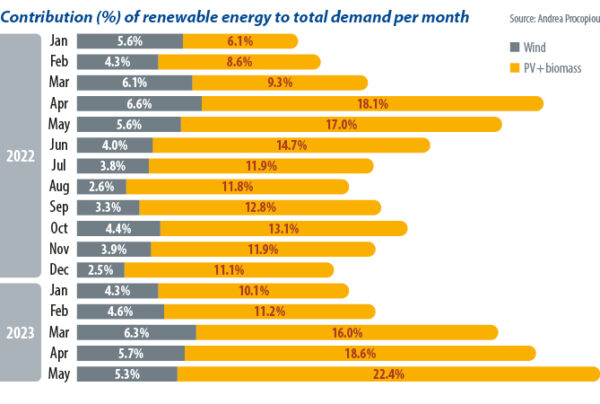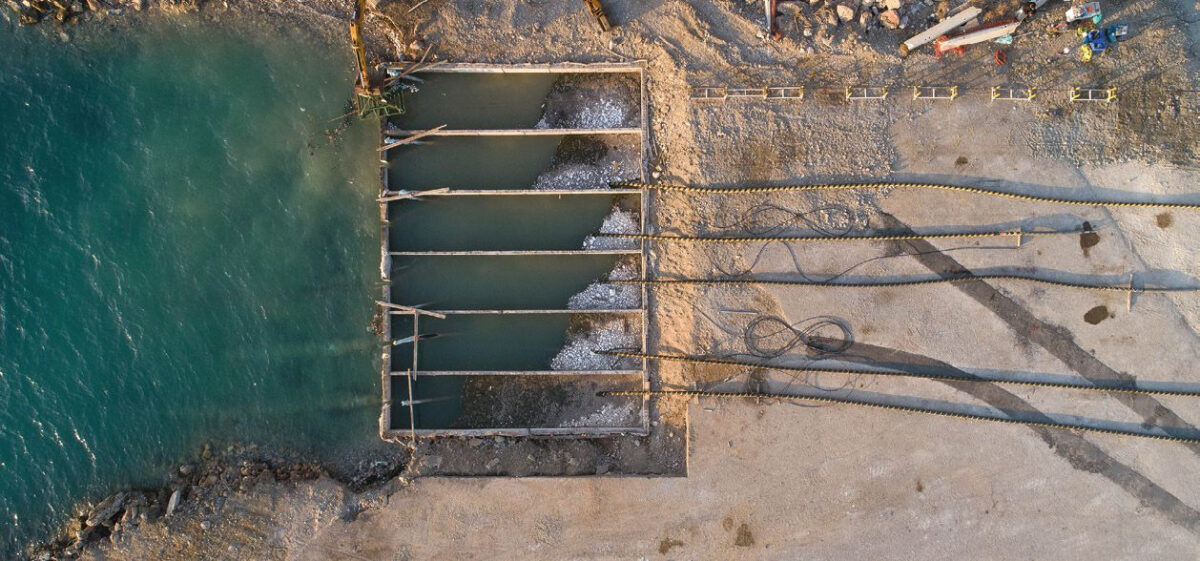The data relating to the curtailment of renewable energy in Cyprus during last year and this make for stark reading. The nation’s grid operator curtailed a daily average of 21% of the clean power generated during the first four months of this year, up from a daily average of 3.35% during the same period in 2022.
State-owned utility the Electricity Authority of Cyprus (EAC) has published curtailment data for both years, providing dates, starting and ending times for when curtailment took place, and the total volume of energy generated in the days when excess power was curtailed. pv magazine has used EAC’s data to create the chart below, which depicts the power generation curtailed.

Clean energy curtailment reached 70% on some days between January 1 and the end of April.
Causes of curtailment
Cypriot renewable energy expert Andreas Procopiou confirmed the validity of pv magazine’s figures and attempted to explain the reasons behind the steep year-on-year increase in curtailment.
“The increase in solar photovoltaic installations, from 342 MW of installed solar photovoltaic capacity in April last year to 476 MW of solar capacity in April 2023 is significant for a small, island country like ours,” says Procopiou – who has previously explored how to increase solar generation in the UK and Australia.
“To provide a deeper understanding, I have graphically represented the data obtained from the Cypriot transmission system operator, illustrating the extent to which renewable energy sources have contributed to the island’s electricity demand during each month,” he says, referring to the chart below.

“The graph shows that the contribution of solar power to the electricity needs of the island grew in the first months of 2023 compared to last year. Still, the penetration of renewable energy in the Cypriot power mix remains relatively low and doesn’t justify, alone, the skyrocketing of power curtailment.”
The main reason, says Procopiou, is that the Cypriot grid today is a reflection of the past and lacks investment in modern infrastructure such as new electricity lines and energy storage. “The government is actively promoting the use of liquefied natural gas (LNG) as a mid-term solution to lower electricity costs,” he adds.
“However, the implementation of these plans, whether through domestic LNG resources or imports, is unlikely to occur before 2028, under the most favourable circumstances. By that time, the EU will already be in the process of gradually transitioning away from gas for electrification. Considering these factors, it’s unlikely that there will be a significant drop in costs.”
“The government is also putting faith in the upcoming electricity interconnection between Greece, Cyprus, and Israel, which is, of course, a very positive development and one that will boost the renewable energy penetration in our island. But the, so-called EuroAsia Interconnector is still a few years away and Cyprus needs to also enable local energy management solutions, especially energy storage.”
Time for storage
“Energy storage in particular is crucial for Cyprus and other islands to increase the use of renewable energy,” adds Procopiou. “The lack of interconnections and the unpredictable nature of renewable sources like solar and wind pose challenges to the electricity system, leading to a reliance on stable, fossil fuel-generated electricity. However, energy storage can help mitigate the uncertainties of renewable generation by acting as a buffer. Without energy storage, the full potential of renewable energy in Cyprus will not be realized, and electricity costs will remain high due to the continued dependence on fossil fuels.”
To date, Cyprus does not have any utility scale energy storage installations. In January last year, the government said it was considering running auctions for the installation of systems combining renewable energy and storage.
Furthermore, in 2022 the Cyprus Ministry of Energy, Commerce and Industry reported that it had designed the auctions scheme and had sent it to the EU for approval. In June, Cypriot energy minister Giorgos Papanastasiou revealed the country has secured €40 million ($43.6 million) for the financing of energy storage systems, via the EU’s post-Covid recovery plan. However, no other progress towards auctioning energy storage appears to have been made. The government does not appear to be in a hurry to install storage.
Meanwhile, as the recent data show, the curtailment of renewable electricity is becoming a pressing problem. The EAC says that “according to the transmission and distribution grid code in force, the Cyprus Transmission System Operator and/or the distribution system operator reserve the right to limit (at any time and without restriction) the renewable energy fed into the transmission, or into the distribution system, in order to safeguard the stable and safe operation of the Cyprus electric system.”
The curtailment problem may lessen during the current season, explains Procopiou. Solar power generation increases significantly in the summer months but demand for energy also increases substantially due to the use of air-conditioners. This combination might lead to less renewable power curtailment through September but the problem will become pressing again from the autumn onwards, argues the solar expert. Renewable power investors do not receive financial compensation for curtailed electricity and high curtailment figures make the renewable energy business uneconomic to run.
Impact on installations
The Cypriot transmission and distribution network operators in January jointly wrote to the then energy minister Natasa Pilides asking for the immediate halt of new net-metered installations in households, citing imminent danger to the stability of the electricity grid. Pilides refused, arguing that this was an “unacceptable, unbelievable, and frustrating” proposal by the network operators.
Pilides argued that household net metering installations are a means to fight energy poverty and alleviate high electricity bills. She also suggested a preference for curtailing the power generation of large energy producers. Her argument was that large renewable energy plants sell power at high prices, making substantial profits, which would enable them to shoulder curtailment.
The election in February of new president Nikos Christodoulides led to a new government, including the appointment of Papanastasiou as energy minister. The newly installed minister had previously spent decades in the fossil fuel industry, including 26 years with BP and more than a decade leading a team in Cyprus aiming to construct and operate an oil storage terminal on the island. During his first months at the ministry, Papanastasiou has been a passionate supporter of natural gas.
Renewables industry insider Procopiou insists the island is not short of renewable energy experts across different disciplines. It remains to be seen which arguments will prevail in the island nation: an outdated reliance on fossil fuels or the shift to a modern, smart, green energy system.
This content is protected by copyright and may not be reused. If you want to cooperate with us and would like to reuse some of our content, please contact: editors@pv-magazine.com.



The smart way for their storage is EVs with V2G and the lowest cost storage, heat and coolth storage where one stores heat or coolth off peak and use at peak.
In the next yr retail battery prices will drop 50-65% so expect many of those solar systems to add batteries.
Personally it sounds like the utility parasites don’t want to give up their FF corruption.
I agree with the comments of Mr Dycus – re utility parasites – there was a very similar article about PV in California & the utilities there going into profit preservation mode. The answer is electrolysers and H2. The H2 can be stored relatively easily. Could even use it to power the gas power stations.